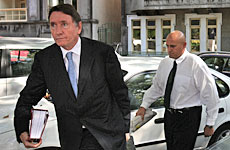|
Allegations of abuse
by NZ Police |
|
|
peterellis
Home / police allegations / Rickards,
Shipton, Schollum vs Jane Doe Page 5 - Further Reaction to
Not Guilty Verdict |
|
|
John Haigh, QC (front), thought Assistant
Commissioner Clint Rickards (rear) could The successful legal defence of
Clint Rickards was based on distancing him as far as possible from Brad Shipton
and Bob Schollum - so far that his lawyer John Haigh, QC, even tried to get a
separate trial. Mr Haigh tried to get
"severance" for Mr Rickards in the trial of the second Rotorua
woman that ended this week in the acquittals of the three men. It was one tactic in a defence
that Mr Rickards has said cost him more than $500,000. It would have meant he
got a separate trial, but was opposed by the Crown and the lawyers for
Shipton and Schollum. It was ruled the trio should be tried together. Mr Haigh said he was concerned
that Mr Rickards could have been tainted by the convictions of Shipton and
Schollum for the Mt Maunganui pack-rape that, although suppressed, had made
it into the public domain via the internet and other sources. He also believed Mr Rickards had a
stronger defence. The Rotorua woman was able to clearly identify Shipton and
Schollum, who never denied knowing her, but Mr Rickards said he had never
seen her in his life. Mr Haigh said Mr Rickards also had
the defence that he was incapacitated after a knee operation for some of the
period during which the alleged indecent assault with a whisky bottle took
place. In a surprise move, Mr Haigh
called former All Black Steve McDowell - a childhood friend of Mr Rickards
through judo - as a witness to back this up. Aside from the legal approach to
distancing him, Mr Rickards also seemed to be physically removing himself
from Shipton and Schollum in the courtroom. Mr Haigh said another defence in
the case of the Rotorua woman, who has name suppression, and of the rape
charges relating to Louise Nicholas was a "direct head-on
rebuttal". This involved Mr Rickards giving
evidence in his own defence in both trials, something the accused is under no
obligation to do. It is generally considered risky because it opens the
defendant up to cross-examination. He considered Mr Rickards, a
former undercover officer who has given evidence in court about 100 times, a
good witness despite criticism that he was a "practised liar" and
was "reciting a mantra" while in the stand. The rebuttal strategy also
included demonstrating that Louise Nicholas and the Rotorua woman had no
credibility. "This may look like we are
just chipping away at the edges or arguing small points, but I believe the
juries in both trials were able to see the overall picture that there were
gaps in the evidence that left much more than reasonable doubt." Mr Haigh commended the juries in
both trials, as well as the jury system when it came to judging historic sex
offences. "Human sexuality is a frail
area in relationships. It is not easy to determine and juries need to apply
their common sense and overlap that with the legal requirements. "They almost always come to
the correct conclusion, I believe." |

